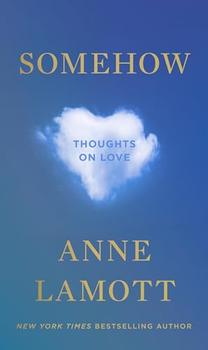Summary | Excerpt | Reviews | Beyond the Book | Read-Alikes | Genres & Themes | Author Bio

Thoughts on Love
by Anne LamottThis article relates to Somehow
 Love is a universal and history-spanning feeling. What would we be without the Romantic movement or the Renaissance, fairy tales or the chivalry of the Middle Ages? Even further back, ancient Greek philosophers such as Plato and Aristotle took note of the many variations of this ubiquitous emotion, creating and describing different words for love.
Love is a universal and history-spanning feeling. What would we be without the Romantic movement or the Renaissance, fairy tales or the chivalry of the Middle Ages? Even further back, ancient Greek philosophers such as Plato and Aristotle took note of the many variations of this ubiquitous emotion, creating and describing different words for love.
In Anne Lamott's essay collection Somehow: Thoughts on Love, she expounds upon various conceptions of love and adds to the definitions laid out by the Greeks: "...from Eros, passionate love, to agape, selfless divine love; or my own addition, mascotas, the love of our animals. It's this feeling, this energy exchange of affection, compassion, kindness, warmth, hope."
There's academic debate about the exact number of Greek words for love, but at least four are generally agreed upon.
Eros is probably the most easily recognizable of the words — synonymous with the modern iteration of romantic love. In addition, as explained by the Internet Encyclopedia of Philosophy, Plato depicts eros as "a common desire that seeks transcendental beauty," as "the particular beauty of an individual reminds us of [the] true beauty that exists in the world of Forms or Ideas."
Philia is often thought of simply as "platonic love" — for the Greeks it was "a fondness and appreciation of the other." The word describes a bond where two people form an intimate connection based on respect and adoration and enjoy being in each other's presence.
Agape (pronounced "ah-GAH-pay") is a word for love with spiritual connotations, though for the Greeks it was more like a universal love for all of humanity demonstrated through charity and kindness. Christians may recognize it from its wide usage in the New Testament, where it took on varying meanings through the years. The best description could be an encompassing love of one's God, or nature, or loving one's neighbor.
Storge (pronounced "store-gay") could most easily be defined as familiarity — a natural progression of sharing values and experiences. It is gentle and safe, but not passionate. Storge encompasses sibling love, or parental love towards one's children.
Other Greek words for love include Philautia ("fee-LO-ti-ah"), which is a term for self-love; Ludus ("loo-dus"), which is a playful, flirtatious love, and Pragma, an everlasting, resilient love.
The many different iterations of love described by the Greeks offer a fascinating window into history, showing us the complexity of human thought on love going back millennia.
"Psyche and Love" by William-Adolphe Bouguereau, 1889, courtesy of Wikimedia Commons
Filed under Cultural Curiosities
![]() This article relates to Somehow.
It first ran in the June 5, 2024
issue of BookBrowse Recommends.
This article relates to Somehow.
It first ran in the June 5, 2024
issue of BookBrowse Recommends.
The whole problem with the world is that fools and fanatics are always so certain of themselves, and wiser people ...
Click Here to find out who said this, as well as discovering other famous literary quotes!
Your guide toexceptional books
BookBrowse seeks out and recommends the best in contemporary fiction and nonfiction—books that not only engage and entertain but also deepen our understanding of ourselves and the world around us.